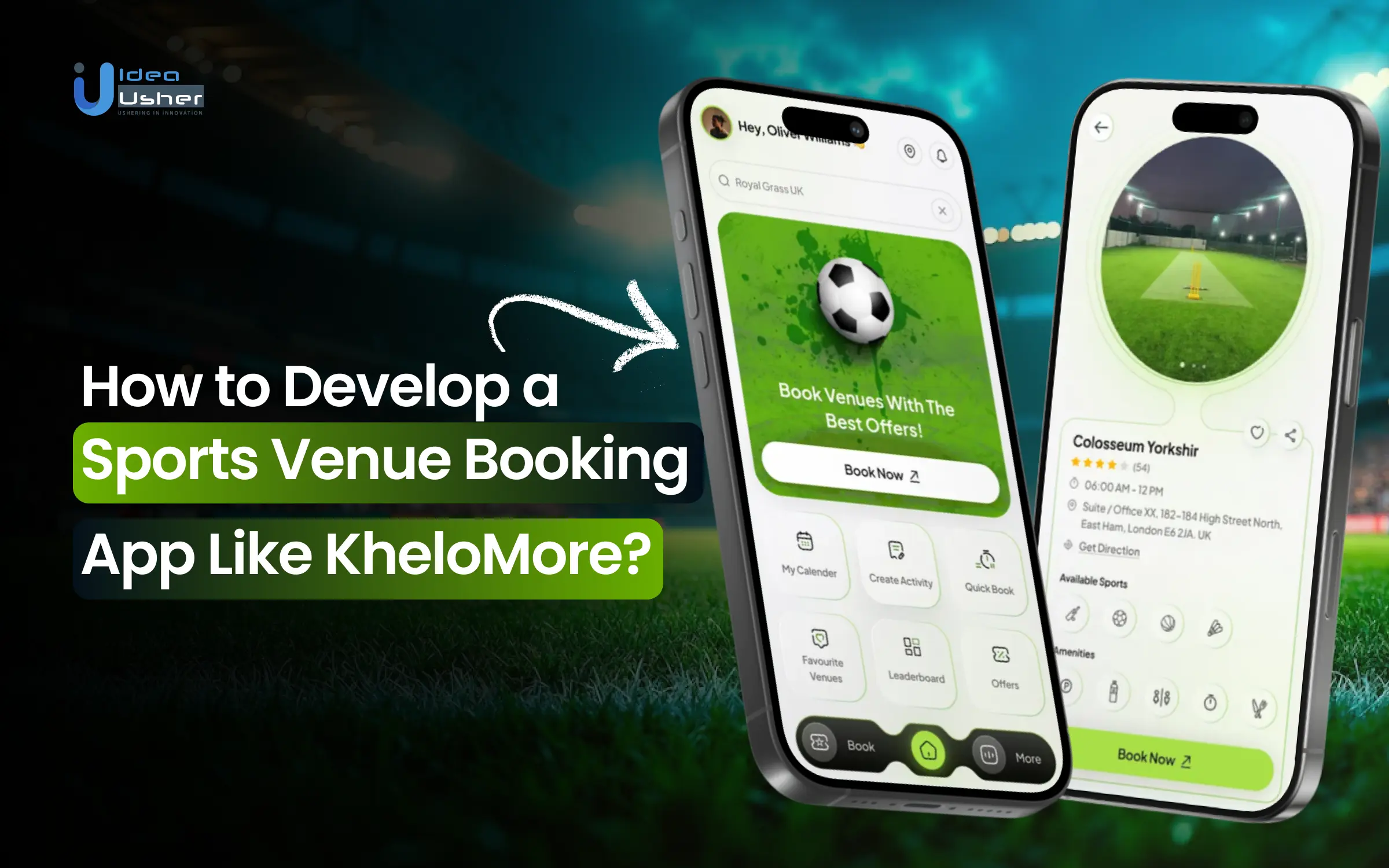The demand for sports facilities has surged in recent years as more people look for convenient ways to book venues for both recreational and professional activities. This growing need has led to the rise of the market for sports venue booking app development, which simplifies the process of finding and reserving spaces. A prime example of success in this space is KheloMore, a platform that has revolutionized how users book sports venues and access coaching services. Its growth showcases the potential of the sports venue app market, making it an appealing opportunity for anyone interested in entering this industry.
Creating a sports venue booking app is not just about building a digital platform. It involves a deep understanding of the sports industry, user behavior, and the technology needed to deliver a smooth, seamless experience. Developing an app like KheloMore can provide not only a valuable service but also a sustainable business model.
In this blog, we’ll explore the key steps involved in developing a sports venue booking app. From identifying essential features to selecting the right technology, this guide will help you understand the development process and provide you with the knowledge needed to create an app that meets the needs of both users and venue owners.
Market Potential for Sports Venue Booking Apps
The global market for sports venue management is expected to see significant growth over the next decade. In 2024, it was valued at approximately USD 0.89 billion and is projected to reach USD 2.22 billion by 2033, reflecting a compound annual growth rate (CAGR) of 11%.
This expansion is largely driven by the increasing adoption of digital tools by sports facilities looking to streamline operations and enhance the user experience. Integrating venue booking functionalities into sports apps is not only a timely response to this growing demand but also positions these apps to take full advantage of the expanding market.
Success Stories of Leading Sports Venue Booking Apps
KheloMore: Launched in 2017, KheloMore is a sports technology platform that offers venue bookings, coaching services, and equipment sales. In July 2024, it secured a $2 million investment to expand its services, including launching cricket academies. This investment highlights the growing potential in the sports venue booking app sector and the broader sports tech industry.
Playo: Playo has established itself as a key player in the sports community space, offering a platform that helps users book sports venues, find players, and organize events. Its success lies in forming strategic partnerships with numerous sports facilities, making it easier for sports enthusiasts to access and enjoy their favorite activities.
Why Invest in a Sports Venue Booking App?
The sports venue booking industry offers numerous opportunities for entrepreneurs and investors. Several key factors make this sector particularly attractive.
1. High Demand Post-Pandemic: The global pandemic has resulted in a renewed interest in recreational sports, as people seek safe and engaging activities. As a result, there is a surge in demand for convenient and efficient booking solutions. Sports venue booking apps are poised to meet this demand, offering users a seamless way to book their favorite venues.
2. Scalability and Franchise Opportunities: One of the major advantages of sports venue booking apps is their scalability. The standardized nature of sports facility operations means that successful platforms can easily expand to new regions and offer franchise opportunities, thereby increasing their reach and profitability.
3. Potential for Strategic Partnerships: Collaborating with sports clubs, academies, and educational institutions provides opportunities to enhance service offerings. These partnerships can attract a larger user base and create additional revenue streams, further boosting the growth potential of sports venue booking apps.
Key Features of a Sports Venue Booking App
A sports venue booking app should provide a smooth and user-friendly experience for both users and venue owners, ensuring convenience and efficiency throughout the process. Below are the essential features for each panel within the app.
User Panel Features:
These features ensure a seamless and intuitive experience for users, making it easier to find and book sports venues.
1. Registration & Profile Management
Users should have the option to easily sign up and create a personalized profile. This feature should allow for both manual registration and social media logins for added convenience. Profile management should let users update their personal information, view past bookings, and manage their payment options.
2. Venue Search & Filters (Location, Sport Type, Price)
An effective search feature is crucial. Users should be able to filter venues based on location, sport type, and price range, making it easy to find venues that meet their specific needs.
3. Real-time Availability & Booking
The app should provide real-time availability of sports venues, ensuring users can see open slots instantly. The booking process should be simple and quick, allowing users to reserve their desired time without any hassle.
4. Online Payments & Refunds
A secure and easy-to-use payment system is essential. Users should be able to make payments through various methods, such as credit/debit cards or digital wallets. A refund system should also be in place, offering users compensation in case of cancellations or issues.
5. Ratings & Reviews
After using a venue, users should have the ability to rate and review their experience. This helps other users make informed decisions and provides valuable feedback to venue owners about the quality of service, cleanliness, and facilities.
Venue Owner Panel Features:
With these tools, venue owners can effectively manage their facilities and bookings, ensuring smooth operations and increased efficiency.
1. Dashboard for Slot Management
Venue owners need an easy-to-navigate dashboard to manage their booking slots. The dashboard should give an overview of available time slots, upcoming bookings, and cancellations, with the ability to make adjustments to availability as needed.
2. Booking Requests & Confirmations
Venue owners should receive notifications about new booking requests and have the ability to confirm or decline them. This gives owners full control over their venue’s schedule.
3. Earnings & Payout Tracking
The app should include features for venue owners to track their earnings and manage payouts. Detailed financial reports, including payments received, outstanding invoices, and payout schedules, will ensure transparency and ease of financial management.
4. Notifications & Alerts
Venue owners should receive real-time alerts for new bookings, cancellations, and special requests. This keeps them informed about any changes to their schedule and ensures smooth operations.
Admin Panel Features:
The admin panel provides full control over the platform, allowing administrators to manage users and venues and monitor the overall performance of the app.
1. User & Venue Management
Administrators should be able to manage both user and venue accounts, including verifying new users, updating venue details, and addressing any issues that may arise. This ensures accurate and up-to-date information across the platform.
2. Commission & Revenue Tracking
Admins need a system to track commissions and revenue. The app should automatically calculate the revenue from bookings and the admin’s share, providing clear and transparent reports for both venue owners and administrators.
3. Dispute Resolution
In case of conflicts between users and venue owners, the admin panel should include a dispute resolution feature. Admins can mediate and resolve any issues to ensure a positive experience for all parties involved.
4. Analytics & Reports
Admins should have access to comprehensive analytics and reports on bookings, revenue, user activity, and venue performance. These insights are critical for making data-driven decisions and improving the app’s functionality.
Advanced Features to Stand Out:
These advanced features not only enhance the user experience but also set your app apart from competitors in the growing sports venue booking market.
1. AI-based Smart Recommendations
An AI-driven recommendation engine can enhance user experience by suggesting venues based on their past bookings, preferences, and behavior. This personalized approach helps users quickly find the best venues suited to their needs.
2. Multi-sport & Tournament Booking
Allowing users to book venues for various sports adds value to the platform. Whether it’s football, basketball, or cricket, offering multi-sport options can attract a wider range of users. Integrating tournament booking features can also appeal to sports leagues and teams looking to reserve venues for competitions.
3. Membership & Loyalty Programs
Incorporating membership or loyalty programs where users can earn points or discounts based on their booking history will encourage repeat use of the app and build customer loyalty over time.
4. Live Chat & Customer Support
A live chat feature enables users to get immediate assistance with any questions or concerns. Responsive customer support is crucial to quickly resolving issues and ensuring a positive user experience.
Step-by-Step Development Process for a Sports Venue Booking App
Developing a sports venue booking app requires a structured approach to ensure both an exceptional user experience and solid backend performance. The process involves various stages, from initial market research to app deployment and marketing. Below is a detailed breakdown of each step involved in creating a successful sports venue booking app.
1. Discovery & Market Research
This phase lays the foundation for a successful app by understanding the market, competitors, and target audience, ensuring the app addresses real user needs.
A. Competitor Analysis
Before development begins, it’s crucial to understand the competitive landscape. Consulting with reputed companies like IdeaUsher and taking help from their experienced developers and market researchers to analyze existing sports venue booking platforms like KheloMore and Playo provides insights into their strengths and weaknesses. Looking at their features, pricing models, and user feedback helps identify gaps in the market and opportunities for differentiation. This research will help you develop a unique value proposition (USP) for your app, making it stand out from competitors.
B. Defining USP & Target Audience
After conducting a competitive analysis, define your app’s unique selling points (USP). What specific features will your app offer that others don’t? Whether it’s a real-time availability feature, a rewards system, or personalized recommendations, understanding these points will help shape the app’s design and functionality. Additionally, identifying your target audience, such as amateur athletes, sports teams, or event organizers, will ensure that the app meets their specific needs and preferences.
2. UI/UX Design
A well-crafted design not only makes the app visually appealing but also ensures a smooth and intuitive user experience, enhancing user retention and satisfaction.
A. Wireframing & Prototyping
The design phase begins with wireframing and prototyping. Wireframes serve as basic blueprints for the app, illustrating how elements are laid out. Prototypes simulate the user flow, giving a tangible sense of how the app will function. Tools like Figma, Adobe XD, or Sketch are commonly used for this process, allowing for easy adjustments based on feedback.
B. User Flow & Experience Optimization
An intuitive user flow is essential for ensuring users can navigate the app effortlessly. Optimizing the user experience focuses on simplifying the booking process, ensuring that users can quickly find a venue, select a time slot, and complete payment with minimal steps. Streamlining these steps increases user satisfaction and encourages return usage.
3. Development Phase
The development phase brings the app to life, combining robust backend infrastructure with a seamless frontend interface, ensuring scalability and performance.
A. Agile Development Methodology
The development phase typically follows an Agile methodology, which allows for flexibility and iterative progress. Development is divided into regular sprints, with feedback collected after each one to guide the next. This approach allows for continuous improvement and integration of new features while maintaining high standards of quality.
B. Backend API Development
The back end of the app handles critical functions such as user data, venue information, and payment processing. Developing robust APIs is key to ensuring smooth data flow and communication between the app’s front and back ends. Technologies like Node.js with Express.js or Django for Python are ideal for creating scalable and secure backends. For databases, MongoDB or PostgreSQL can be used, depending on the app’s complexity.
C. Frontend App Development
For front-end development, React Native is a popular choice for building cross-platform apps that work on both iOS and Android. Alternatively, Swift can be used for iOS apps and Kotlin for Android apps. The front end is responsible for presenting the user interface and ensuring that all features, such as booking forms and payment gateways, work seamlessly. It’s important to design a responsive app that functions smoothly across all device sizes.
4. Testing
Thorough testing ensures that the app functions flawlessly, minimizing bugs and optimizing performance for a smooth and reliable user experience across all devices.
A. Functional & Performance Testing
Once core features are integrated, comprehensive testing is essential to ensure everything works as expected. Functional testing checks if features like venue booking, payment systems, and notifications are functioning correctly. Performance testing ensures the app performs well under varying loads, especially during high-traffic times. Tools like Selenium for automated testing and JMeter for load testing are useful in this phase.
B. Bug Fixes & Optimization
During testing, bugs and performance issues will likely arise. Identifying and fixing bugs is crucial to ensure the app runs smoothly. Optimization focuses on improving speed and responsiveness, ensuring the app provides a fast, seamless experience. Tools like Xcode and Android Studio can be used for debugging, while code reviews help identify areas for improvement.
5. Deployment & Launch
Once the app is fully tested and optimized, it’s launched to the public, followed by strategic marketing efforts to drive user acquisition and engagement.
A. App Store & Play Store Submission
Once testing is complete, the app is ready for submission to the App Store and Google Play Store. Both platforms have specific guidelines that must be followed, such as submitting privacy policies, user permissions and adhering to content standards. Once your app is approved, it will be available for download by users worldwide.
B. Marketing & User Acquisition Strategies
After launch, effective marketing is key to driving user acquisition. Social media campaigns, influencer partnerships, and app store optimization (ASO) can boost visibility. Paid ads on platforms like Google and social media help target the right audience. Additionally, offering promotional discounts or loyalty programs can incentivize users to try the app. Partnering with local sports events, gyms, or sports academies can also help build credibility and attract new users.
Work with Ex-MAANG developers to build next-gen apps schedule your consultation now
What is the Cost of Developing a Sports Venue Booking App?
The cost of developing a sports venue booking app can vary widely depending on several factors, such as app complexity, features, and the development team’s expertise.
| Type of App | Cost Range | Features Included |
| Basic App (MVP) | $10,000 – $25,000 | Core features like venue search, booking, and payment integration. |
| Intermediate App | $25,000 – $50,000 | Additional features like real-time availability, venue ratings, and event management. |
| Advanced App | $60,000 – $100,000+ | Multi-venue management, social sharing, advanced payment integrations, and custom UI/UX. |
These cost estimates offer a guideline, but final prices may vary based on project requirements, customizations, and team expertise. A detailed discussion with your development team is essential to obtain an accurate quote for your needs and features.
Factors Affecting Development Cost
The cost of developing a sports venue booking app can be influenced by a variety of factors, each contributing to the overall budget. Understanding these factors helps you make informed decisions about the scope and complexity of your app, ensuring you stay within budget while meeting your objectives.
1. App Complexity & Features
Basic apps with essential functionalities like venue search, availability booking, and payment integration typically cost between $10,000 and $30,000. For apps that include more advanced features such as real-time availability, multi-venue management, and social sharing, costs may increase to $30,000 to $80,000+.
2. Platform (iOS, Android, or Both)
Developing for multiple platforms, such as iOS, Android, and web, typically increases costs by 30-40%. Expect the cost for multi-platform development to range between $15,000 and $60,000+ depending on whether the app is developed natively or cross-platform.
3. Design Complexity
Simple UI/UX design will generally cost around $5,000 to $15,000, while custom designs tailored to your brand with enhanced user experience may increase design costs to $20,000 to $40,000+.
4. Third-Party Integrations
Integrating services like payment gateways (e.g., Stripe, PayPal), maps for venue locations, or real-time booking systems can cost an additional $5,000 to $15,000, depending on the complexity of these integrations.
5. Testing and Quality Assurance
Testing ensures that your app works as intended across all devices and platforms. Testing costs typically range from $5,000 to $10,000+ depending on the app’s complexity and the number of testing phases required.
6. Ongoing Maintenance and Updates
After the app is developed, ongoing maintenance as bug fixes, updates, and security patches is essential. Expect to spend about 10–20% of the total development cost annually for maintenance and updates.
Monetization Strategies for Sports Venue Booking Apps
A sports venue booking app can generate consistent revenue and expand its business by implementing various monetization strategies. Here’s an overview of potential options to consider:
1. Commission-Based Model
This model involves taking a percentage of each booking made through the app. It’s a straightforward and effective way to earn consistent revenue.
Example: For each booking made, the app takes a small commission (e.g., 5-10%), ensuring the platform generates income without needing upfront payments.
2. Subscription Model
In this model, users pay a recurring subscription fee to access premium features or services.
Example: Subscribers may enjoy benefits such as priority booking, exclusive venue availability, discounts, or advanced booking options. This encourages users to pay for continued access to enhanced functionalities.
3. Premium Listings
Venue owners or event organizers can pay for better visibility and placement in search results, ensuring their venues get more attention.
Example: Venues can opt for premium listings that appear at the top of search results, increasing the chances of being booked by users who are looking for popular venues.
4. In-App Advertising
Displaying ads from third-party sponsors or related businesses within the app can help generate revenue.
Example: Banner ads, interstitial ads, or sponsored venue listings can be used to monetize the app while offering advertisers access to a targeted audience interested in sports and events.
5. Value-Added Services
Offering additional services related to sports venues can provide added convenience for users while generating extra revenue.
Example: The app could allow users to rent sports equipment, book coaching sessions, or purchase event tickets directly through the platform, increasing both user satisfaction and app revenue.
6. Partnerships and Sponsorships
By collaborating with sports brands, local businesses, or event organizers, you can create sponsorship deals or joint marketing initiatives.
Example: Partnering with sports brands to offer exclusive discounts or deals to users who book through the app can create mutually beneficial relationships with sponsors while boosting user engagement.
7. Freemium Model
In this model, basic features are offered for free, but premium services or advanced functionalities require payment.
Example: Users can make standard venue bookings for free but must pay for access to advanced features such as priority support, ad-free experiences, or enhanced filters for searching venues.
8. Data Monetization
Collecting and analyzing user data can provide valuable insights into user behavior. This data can then be sold to third parties for marketing or research purposes.
Example: The app could sell anonymized, aggregated data to sports brands, equipment manufacturers, or event organizers to help them make data-driven decisions or target their advertising more effectively.
9. Loyalty Programs
Loyalty programs can incentivize repeat users by offering discounts, early access, or exclusive perks.
Example: Users could earn loyalty points or discounts for every booking they make, which can be redeemed for free bookings, special offers, or VIP access to high-demand venues.
Conclusion
Creating a sports venue booking app like KheloMore requires careful planning and a focus on both design and functionality. To build a successful platform, it’s important to incorporate key features like real-time availability, easy payment options, and a user-friendly interface. Thorough research, understanding market trends, and choosing the right technology stack are crucial steps in making your app stand out. With a well-executed development process from start to finish, your app will be well-positioned for success in the competitive sports venue booking industry.
Create Your Sports Venue Booking App with IdeaUsher!
At IdeaUsher, we specialize in building intuitive and user-friendly booking platforms that simplify the process for both users and venue owners. Our team of skilled developers from ex-FAANG/MAANG and designers work closely with you to create a customized solution tailored to your business goals and user needs.
We focus on providing seamless functionality, real-time availability, secure payment processing, and easy navigation to ensure your app delivers both convenience and a high level of user engagement. Whether you want to incorporate advanced features like AI-powered recommendations, real-time scheduling, or detailed analytics, our expertise in app development can help turn your vision into reality.
Partner with IdeaUsher to build a powerful and scalable sports venue booking app that offers an exceptional user experience.
Check out our portfolio to see how we’ve helped other businesses achieve their app development goals!
Work with Ex-MAANG developers to build next-gen apps schedule your consultation now
FAQs
Q.1. What are the essential steps to develop a sports venue booking app?
Developing a sports venue booking app involves several key steps, including market research, feature planning, database creation, real-time availability, a robust booking engine, and user-friendly interface design, along with features like reviews, communication, and partnerships.
Q.2. How much is the sports venue booking app development cost?
Developing a sports venue booking app can cost anywhere from $10,000 to $100,000 or more, depending on the complexity, features, and development team’s location. The final cost will also depend on factors such as the platform (iOS, Android, or both), design complexity, and any third-party integrations required for the app.
Q.3. What are the essential features needed in a sports venue booking app?
Key features include venue search and filters, real-time availability, booking functionality, secure payment integration, and ratings/reviews. Additional features like event management, multi-venue support, and notifications can enhance the user experience.
Q.4. How do I monetize a sports venue booking app effectively?
Monetization options include commission on each booking, subscription models for premium features, advertising partnerships with sports brands, and offering additional services like coaching or equipment rentals.






















